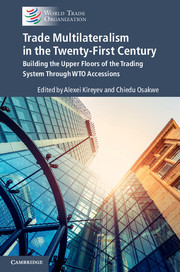 Trade Multilateralism in the Twenty-First Century
Trade Multilateralism in the Twenty-First Century from PART I - WTO Accessions and the New Trade Multilateralism
Published online by Cambridge University Press: 28 November 2017
Abstract
Accessions to the World Trade Organization (WTO) generate large amounts of data accumulated during accession negotiations and subsequent domestic reforms. Owing to differences in the structure of acceding economies, accession commitments vary across recently acceded, or Article XII, members, in the number of tariff lines bound, the level of bindings and the various accession-specific commitments and obligations. The depth of commitments and extent of post-accession implementation influence the effectiveness of benefits derived by new members from WTO accession. In spite of the generally positive economic performance exhibited by all Article XII members, disparities exist in their country-specific economic performance in terms of trade, foreign direct investment (FDI) and gross domestic product (GDP) growth. This chapter analyses the impact and depth of accession commitments to assess the economic effects of WTO accession. It explores how the data from accessions acquis can assist policy-makers in implementing structural reforms and integrating their countries into regional and global value chains. An Accession Commitment Index is proposed as a basis for a statistical exploration of the impact of WTO accession on a series of variables related to economic growth. Using an extension of the difference-in-difference methodological approach, the chapter finds that WTO accession generally has a positive and significant impact on the acceding economy's trade and economic performance. The results also show that the impact of WTO membership on the trade/GDP ratio in developing countries is significantly higher than in previous studies.
Decoding Accession Commitments
Outcomes of WTO Accession Negotiations
Central to negotiating WTO membership is the obligation of acceding governments to bring their domestic legislation and trade-related policies into compliance with WTO rules. Thus far, over 7,000 items of law and regulations have been notified and passed by the acceding governments, resulting in comprehensive domestic reforms. Since the establishment of the WTO, the amount of legislation notified by acceding governments has more than tripled. The average number of laws and rules enacted by a government undergoing WTO accession has grown from approximately 81 items in 2000 to 300 items in 2012. This has signified an increase in the importance of the rule of law in acceding governments and more accession commitments are being made. These commitments/obligations are often seen as necessary to set in motion domestic structural reforms.
To save this book to your Kindle, first ensure no-reply@cambridge.org is added to your Approved Personal Document E-mail List under your Personal Document Settings on the Manage Your Content and Devices page of your Amazon account. Then enter the ‘name’ part of your Kindle email address below. Find out more about saving to your Kindle.
Note you can select to save to either the @free.kindle.com or @kindle.com variations. ‘@free.kindle.com’ emails are free but can only be saved to your device when it is connected to wi-fi. ‘@kindle.com’ emails can be delivered even when you are not connected to wi-fi, but note that service fees apply.
Find out more about the Kindle Personal Document Service.
To save content items to your account, please confirm that you agree to abide by our usage policies. If this is the first time you use this feature, you will be asked to authorise Cambridge Core to connect with your account. Find out more about saving content to Dropbox.
To save content items to your account, please confirm that you agree to abide by our usage policies. If this is the first time you use this feature, you will be asked to authorise Cambridge Core to connect with your account. Find out more about saving content to Google Drive.